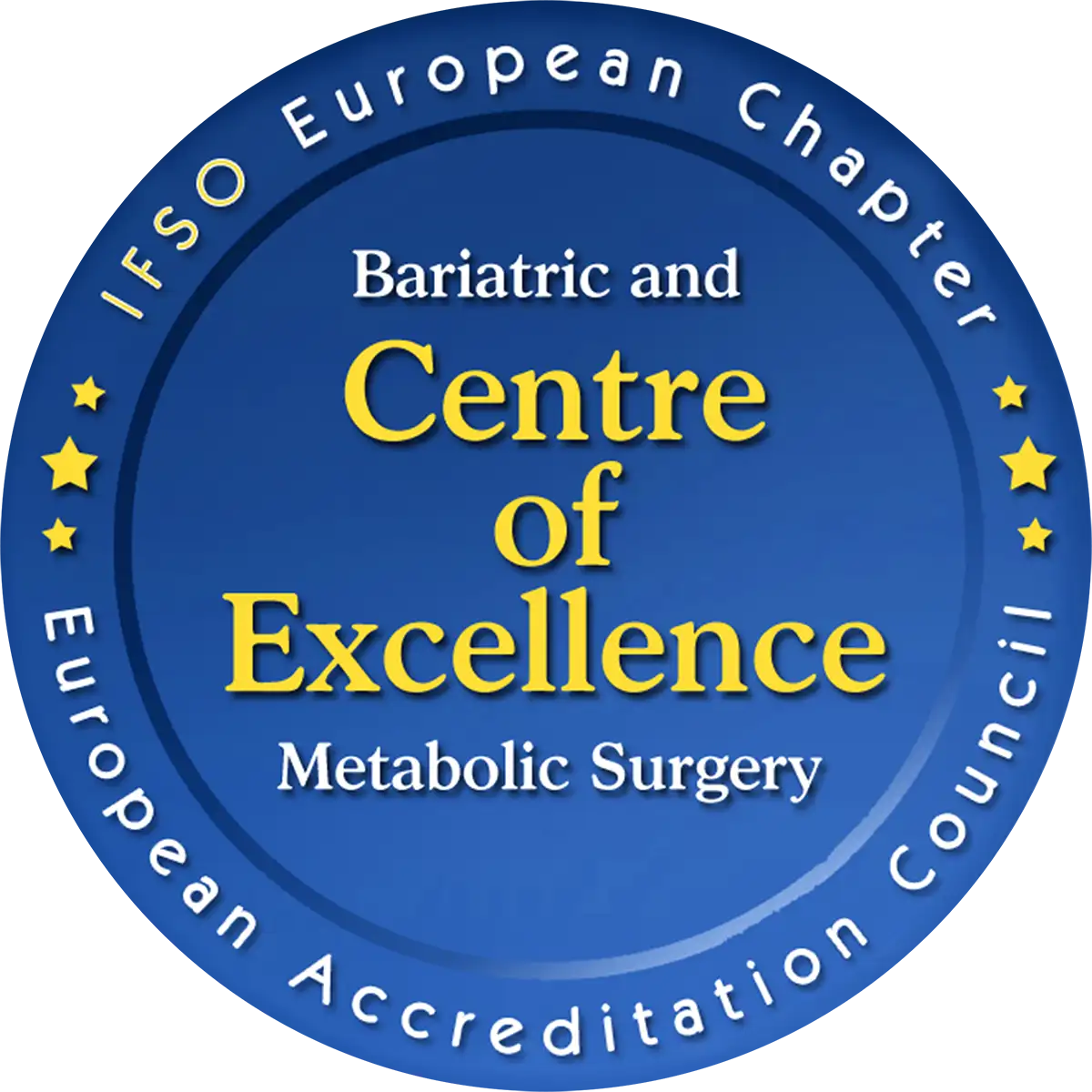Can every overweight person have stomach reduction surgery?
Of course not! Stomach reduction surgeries are useful and even life-prolonging only in cases where obesity is above a certain level.
What obesity level should a person exceed for being an eligible candidate for stomach reduction surgery?
Bariatric surgery is not an aesthetic surgery procedure. Therefore, the procedure is never performed on an overweight or mild obese patient, even if he/she yearns for it with aesthetic concerns. On the other hand, since it a procedure that has a proven life-prolonging effect, it should definitely be employed in cases where the patient regained weight after trying at least two diets, and in cases of unhealthy fatness, medically known as “morbid obesity”. If the person has a BMI (body mass index) over 40, or has a BMI between 35 and 40 and has also at least two of comorbidities such as diabetes, hypertension, sleep apnea, and fatty liver, it is a case of “morbid obesity” that definitely requires surgery.
How is body mass index calculated?
It is the figure that we obtain when we divide our weight by the square of our height. For example, the body mass index of a person with a weight of 100 kg and a height of 2 meters is 100/4 = 25.
We can also define the morbid obesity concept as high-level of obesity that causes fatal problems and consequently shortens the life obviously, due to the risks that it poses to the person. Surgery is an option for those who are severely overweight but cannot lose weight despite all diets and other precautions, which rarely give favorable results and enable only 2-3% of patients to succeed. Even if morbidly obese patients lose weight with diets, 95% of them regain weight due to YOYO syndrome.
In such a person, obesity leads to diabetes and hypertension after a certain stage, and these complications occur at very early ages in morbidly obese patients. These co-morbid problems developing due to obesity are medically known as “comorbidities”. As is known, arteriosclerosis is still the first cause of death in our time, and the most important risk factors for the development of atherosclerosis are diabetes and hypertension. Therefore, if morbidly obese patients are not treated, they lose their lives much earlier than other people of the same age, due to arteriosclerosis and its consequential problems such as heart attack or stroke.
The surgical procedures medically known as “bariatric surgeries” that we can define as surgical interventions eliminating obesity are life-saving procedures that prolong life by 10 years, and also pose less risk than thought. For this reason; they are performed very actively and increasingly throughout the world, despite the risks they pose to patients. This is because they rapidly solve co-morbid problems (Type II diabetes and hypertension in particular) besides the elimination of obesity, and they are also procedures proven to considerably prolong life of patients and magnificently improve their quality of life. In our time, the second most common laparoscopic surgery after cholecystotomy is bariatric surgery in the United States.
What are the most effective surgical methods for the elimination of obesity?
Today there are two bariatric interventions most commonly used and preferred in the world (and by medical team). These are “sleeve gastrectomy” and “gastric by-pass”. Sleeve gastrectomy operations have become the most commonly performed surgical procedures because they pose no risk to patients in their subsequent lives, and allow for a second surgery in cases of inadequate weight loss that can be seen at a rate of 20 percent. All these procedures are performed routinely with the laparoscopic i.e. closed method. Therefore, all the advantages of laparoscopy are completely available for bariatric surgery, as well. In other words, they do not involve abdominal incision, the pain is minimal, aesthetic results are perfect, patients can get up immediately after surgery, can be discharged after a few days, and can return to work after 5-10 days. Patients lose 80% of their excess weight within 1 year. The weight loss process ends after 1 year. Patients should not consider the treatment as only a surgical procedure. The most important key to success is to ensure the patient to be supported with a patient follow-up program carried out by a very good dietitian, and a very good psychologist as well as the staff members of the clinic, where the procedure has been performed.
Is the stomach reduction surgery difficult and very painful? Does it leave a scar?
All bariatric surgeries are performed laparoscopically, i.e. with the “closed” method. Therefore, the procedure does not involve a long abdominal incision, and inside the abdomen is accessed through a millimetric hole. For this reason, it causes almost no postoperative pain. Patients get up the same day, get discharged within a few days, and return to work after about 1 week. Since it involves no incision, it leaves no scar; and therefore, provides perfect aesthetic results.
Is it possible to regain weight after stomach reduction surgery?
Even if it is barely possible, yes, it is possible. Therefore, morbidly obese people should consider this surgical procedure as a beginning, not as an end. After stomach reduction procedure, such people lose weight to an extent that they could not even imagine and could not achieve with diets or other methods tried for years. However, patients have important responsibilities to lose weight healthfully and avoid weight regain in the long term. Following the protocols of our center, adding appropriate exercises to the program, staying away from alcohol, and eliminating some wrong dietary habits, are the secrets of long-term success. Therefore, it would be wise to consider stomach reduction surgeries as a “golden key” granted to patients. This key can do what a diet cannot do, and provides a second chance of life (even a 10 times higher quality life!) to morbidly obese people, by opening a new door for them.
Are stomach reduction surgeries effective on diabetes and hypertension ?
These surgical procedures treat advanced Type 2 diabetes and hypertension that have developed due to obesity. They also improve fertility in women, and sexual virility men. They are the most successful treatment of polycystic ovary syndrome. They obviously reduce the risk of getting breast cancer in women. Moreover, they considerably improve fatty liver and sleep apnea. As a result of all of these, patients get rid of taking a handful of drugs, they can move much more easily, and the joints say goodbye to such serious loads. When considered in this context, many orthopedic operations intended for placing knee and hip prostheses will also be avoided. Moreover, arteriosclerotic development will slow down. In addition, physical weight loss makes a great contribution to the elimination of reduced self-confidence. All of these factors together will provide an obviously prolonged and higher quality life.
Are Gastric By-Pass Surgeries more effective than Stomach Reduction Surgeries?
Gastric by-pass surgeries involve reducing the stomach and then attaching the intestine, cut from a certain distance, directly to the reduced stomach. The goal is to reduce food intake, and prevent some portion of the intestines from contacting foods, so as to reduce food absorption to provide weight loss. In the 1990s, gastric by-pass surgeries become very popular, particularly in the United States. It is another scientific fact that sleeve gastrectomy surgeries have rapidly superseded gastric by-pass surgeries in the last decade.
For example, the number of stomach reduction surgeries (sleeve gastrectomy) exceeded the number of gastric by-pass surgeries as from 2013 in the United States, where approximately 250,000 bariatric surgical procedures are performed annually. There are three main causes of this. The first cause is that stomach reduction surgeries have been found to be as effective as gastric by-pass surgeries, in terms of providing weight loss. The second cause is that weight regain is always possible, no matter the surgical procedure performed. It is surgically quite difficult, often even not possible, to help the patient with a second surgery, in the cases of weight regain that can constitute 20% of the total number in the series of gastric by-pass surgeries. However, a second chance is always possible in stomach reduction surgeries; and relatively, their conversion to one of the types of by-pass is technically easier. The third important cause is that long-term follow-up of gastric by-pass is more difficult in terms of vitamin and mineral deficiencies. In addition, gastric by-pass may lead to serious complications such as intestinal kink, and gastric ulcer perforation.
We agree with the opinion of authors in many countries that gastric bypass surgery should be limited. For the last 4 years, we have performed the stomach reduction procedure (sleeve gastrectomy) on our patients other than those severely in need of insulin.
Are stomach reduction surgeries dangerous?
The risk rate of these totally closed surgical procedures is extremely reasonable. Being morbidly obese exposes patients to a lethal risk that is much more higher than the surgical risk, and this why the surgical procedures intended for eliminating obesity are the procedures becoming rapidly more common with each passing day all over the world. When performed in experienced and well-equipped centers, its risk is equal to that of cholecystotomy.
Approach of Turkcapar Bariatrics:
KTo take an example from our practices, we have not lost any of our hundreds of patients, on whom we have performed bariatric surgery, and we have never encountered fatal complications. This is entirely related to self-devotion to a topic, availability of high technology on hand, experience, and teamwork.
On the other hand, when patients are offered the option of surgical treatment, they should definitely question the experience of the medical team. Serious complications of this kind of surgical procedures such as leakage, bleeding, and stenosis are encountered at a rate of 1-3%, and this is directly related to the experience of the surgeon.





